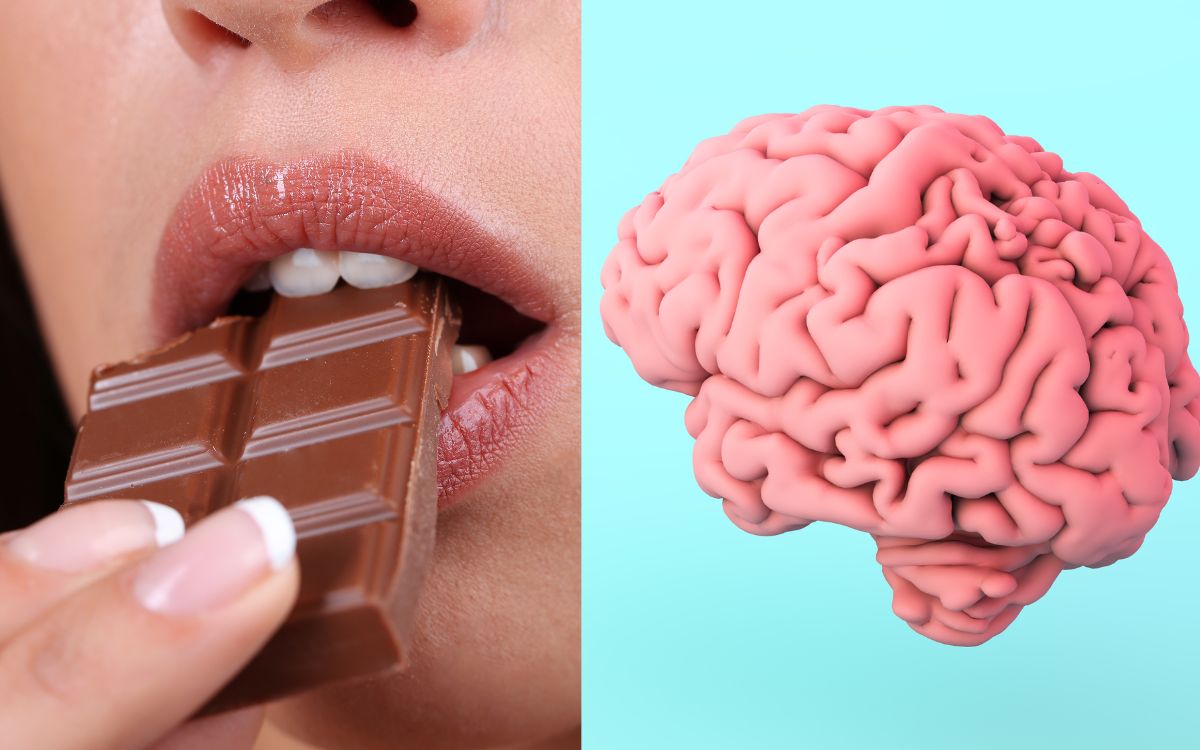Chocolate has been a beloved treat for centuries, known for its rich and indulgent flavor. But beyond its delectable taste, there have been claims that chocolate can also provide cognitive benefits, such as improving memory and enhancing brain function.

In this article, we will delve into the scientific evidence behind these claims and explore whether chocolate truly has the potential to boost our mental abilities. So, let’s indulge in the world of chocolate and unravel the truth behind its impact on memory and cognitive function.
Understanding Memory and Cognitive Function
Memory and cognitive function play crucial roles in our daily lives, influencing how we learn, process information, and make decisions. To grasp the potential impact of chocolate on these cognitive processes, it is essential to understand their underlying mechanisms.
Memory and Its Different Types
Memory can be classified into different types, including short-term, long-term, and working memory. Short-term memory allows us to temporarily hold and manipulate information. Long-term memory involves the storage and retrieval of information over an extended period. Working memory refers to our ability to actively hold and manipulate information in our minds.
Cognitive Function and Its Components
Cognitive function encompasses various mental processes, such as attention, processing speed, problem-solving, and decision-making. Attention refers to our ability to focus on relevant stimuli while filtering out distractions. Processing speed relates to the speed at which we can perceive and process information. Problem-solving involves using cognitive resources to find solutions to challenges.
Importance of Memory and Cognitive Function in Daily Life
Both memory and cognitive function are essential for our overall cognitive abilities. They influence how we absorb, retain, and retrieve information, as well as how we analyze and respond to the world around us. Understanding these fundamental cognitive processes provides a foundation for exploring the potential effects of chocolate on memory and cognitive function.
The Components of Chocolate
To comprehend how chocolate may affect memory and cognitive function, it is essential to explore its composition and the specific components that contribute to its properties. Chocolate derives from cocoa beans, which undergo various processing steps before becoming the delightful treat we know.
Cocoa Beans and Their Composition
Cocoa beans are the primary ingredient in chocolate. These beans are harvested from the cacao tree and undergo a complex production process. Cocoa beans contain a range of components, including cocoa solids, cocoa butter, and various bioactive compounds that contribute to chocolate’s unique characteristics.
Flavanols: The Key Compounds in Chocolate
One group of bioactive compounds found in cocoa beans is flavanols. Flavanols are a type of flavonoid, which are naturally occurring plant compounds with antioxidant properties. These compounds are most abundant in dark chocolate and cocoa powder, particularly when compared to milk chocolate.
Exploring Flavanols and Their Potential Benefits
Flavanols have garnered significant attention due to their potential health benefits. They have been linked to various positive effects, such as antioxidant activity, improved blood flow, and anti-inflammatory properties. These properties have raised interest in their potential impact on memory and cognitive function.
How Flavanols May Impact Memory and Cognitive Function
Studies suggest that flavanols might have neuroprotective effects and promote brain health. Flavanols may enhance blood flow and oxygenation to the brain, potentially influencing memory and cognitive function. However, further research is needed to fully understand the specific mechanisms through which flavanols affect the brain.
The Science Behind Chocolate and Cognitive Function
Delving into the scientific research surrounding chocolate and cognitive function is essential to determine whether there is a valid connection between the two. Numerous studies have investigated the potential effects of chocolate consumption on memory, attention, and other cognitive processes.
Research Studies on Chocolate and Cognitive Health
Over the years, several studies have been conducted to examine the relationship between chocolate and cognitive function. These studies employ different methodologies, including observational studies, randomized controlled trials, and systematic reviews, to evaluate the effects of chocolate consumption on various cognitive measures.

Examining the Methodologies and Findings
Researchers have employed diverse approaches to assess cognitive function, such as memory tests, attention tasks, and cognitive performance assessments. These studies investigate the impact of chocolate consumption on cognitive outcomes, comparing the effects of chocolate to control groups or alternative interventions.
Positive Outcomes and Limitations of the Studies
Some studies suggest positive associations between chocolate consumption and cognitive function, showcasing potential benefits on memory, attention, and other cognitive domains. However, it is important to note that the research findings are not always consistent, and several factors contribute to the limitations and complexities of interpreting the results.
Flavanols and Brain Health
Exploring the potential impact of flavanols, the key compounds found in chocolate, on brain health is crucial to understanding their relationship with memory and cognitive function. Flavanols possess antioxidant properties and have been associated with various health benefits.
Flavanols as Antioxidants
Flavanols act as potent antioxidants, helping to combat oxidative stress and reduce the damage caused by free radicals in the body. Oxidative stress is implicated in neurodegenerative diseases and cognitive decline, making antioxidants crucial for maintaining brain health.
The Role of Antioxidants in Brain Health
Antioxidants play a significant role in protecting the brain from oxidative damage, which can lead to the deterioration of cognitive function. By neutralizing free radicals and reducing oxidative stress, antioxidants contribute to overall brain health and potentially mitigate age-related cognitive decline.
Potential Benefits of Flavanols for Neuroprotection
Studies suggest that the antioxidant properties of flavanols may have a neuroprotective effect, shielding the brain from damage and supporting its overall health. This potential neuroprotection may contribute to improved memory and cognitive function, although further research is needed to establish definitive conclusions.
Impact of Chocolate on Memory
Investigating the impact of chocolate consumption specifically on memory is a key aspect of understanding its potential cognitive benefits. Numerous studies have explored whether indulging in chocolate can have a positive influence on memory processes.
Memory Enhancement Studies with Chocolate
Researchers have conducted studies to investigate the effects of chocolate on memory performance. These studies often involve participants consuming chocolate or cocoa products before engaging in memory tests or tasks designed to assess various aspects of memory function.
Investigation of Short-Term and Long-Term Memory Effects
Some studies have focused on short-term memory, examining the immediate effects of chocolate consumption on memory tasks. Others have explored the potential impact on long-term memory, assessing the retention and retrieval of information over a more extended period.
Factors Influencing Memory Improvement
Various factors can influence the potential memory-enhancing effects of chocolate. These include the type of chocolate consumed (dark chocolate with higher cocoa content versus milk chocolate), dosage, the presence of other bioactive compounds, and individual differences in response to chocolate.
Cognitive Function and Chocolate Consumption
Understanding the potential effects of chocolate consumption on overall cognitive function is crucial in evaluating its impact on cognitive performance beyond memory alone. Research studies have explored how indulging in chocolate may influence attention, processing speed, and other cognitive domains.
Chocolate’s Impact on Attention and Focus
Some studies have examined the effects of chocolate on attention span and focus. Attention tasks, such as those measuring sustained attention or selective attention, have been used to assess the potential influence of chocolate consumption on these cognitive processes.
Effects of Chocolate on Cognitive Performance
Research has explored whether chocolate consumption can influence other cognitive functions, including processing speed, problem-solving, and decision-making. These studies aim to uncover potential associations between chocolate intake and improvements in various cognitive domains.
Factors Affecting Cognitive Performance
The impact of chocolate on cognitive function may vary depending on several factors. These factors include the type and quality of chocolate consumed, individual differences in response to chocolate, and the overall dietary and lifestyle habits of individuals.
Other Factors Influencing Chocolate’s Effects
When examining the potential effects of chocolate on memory and cognitive function, it is crucial to consider various factors that can influence its outcomes. These factors go beyond the composition of chocolate itself and encompass individual differences, genetic factors, and interactions with other substances.
Individual Differences and Genetic Factors
Each person’s response to chocolate consumption can vary due to individual differences. Factors such as age, gender, overall health, and genetic variations can influence how an individual’s body metabolizes and responds to the bioactive compounds in chocolate.
Genetic Variations and Their Influence on Chocolate’s Effects
Certain genetic variations can impact an individual’s sensitivity to the effects of chocolate. Genetic factors related to metabolism, neurotransmitter systems, and taste perception can influence the way individuals respond to the bioactive compounds in chocolate, potentially affecting its cognitive effects.
Interactions between Chocolate and Individual Biochemistry
The effects of chocolate consumption can also be influenced by an individual’s overall biochemistry and the presence of other substances. For example, medications, caffeine, or other dietary components may interact with chocolate and modify its cognitive effects.
Dark Chocolate vs. Milk Chocolate
When exploring the potential effects of chocolate on memory and cognitive function, it is important to consider the differences between dark chocolate and milk chocolate. These two varieties of chocolate have distinct compositions and varying levels of bioactive compounds that can potentially impact cognitive health.

Dark Chocolate: Higher Cocoa Content and Flavanols
Dark chocolate is known for its higher cocoa content compared to milk chocolate. Cocoa solids contain a higher concentration of bioactive compounds, including flavanols. Flavanols have been associated with potential cognitive benefits due to their antioxidant and neuroprotective properties.
Milk Chocolate: Lower Cocoa Content and Potential Additives
Milk chocolate, on the other hand, typically contains a lower percentage of cocoa solids and a higher proportion of milk solids and added sugars. The reduced cocoa content in milk chocolate results in lower levels of bioactive compounds, including flavanols.
Comparing the Effects of Different Chocolate Types
Studies comparing the effects of dark chocolate and milk chocolate on memory and cognitive function have provided mixed results. Dark chocolate, with its higher flavanol content, has shown more promising associations with cognitive health, while the effects of milk chocolate are less pronounced due to its lower cocoa content.
The Moderation Factor
When considering the potential benefits of chocolate on memory and cognitive function, it is crucial to emphasize the importance of moderation. While chocolate contains bioactive compounds that may have positive effects, consuming it in excess or as the sole focus of a diet may lead to unintended consequences.
Caloric and Nutritional Considerations
Chocolate, particularly in its more indulgent forms, can be high in calories, added sugars, and fats. Excessive consumption of chocolate without considering its nutritional context can contribute to weight gain, imbalanced diets, and potential negative impacts on overall health.
Balancing Chocolate with a Healthy Lifestyle
It is essential to incorporate chocolate consumption within a well-rounded and balanced diet. This means pairing it with nutrient-dense foods, such as fruits, vegetables, whole grains, and lean proteins, while also considering individual dietary needs and goals.
The Role of Moderation in Maximizing Potential Benefits
By practicing moderation, individuals can enjoy the potential cognitive benefits of chocolate while minimizing potential negative effects. Moderation involves consuming chocolate as part of a diverse diet that includes other healthy foods, while being mindful of portion sizes and overall calorie intake.
Other Ways to Enhance Memory and Cognitive Function
While the potential benefits of chocolate on memory and cognitive function are intriguing, it is important to explore other strategies that can promote optimal brain health and cognitive abilities. Incorporating various lifestyle factors and habits can have a significant impact on memory and cognitive function.
Healthy Diet
Consuming a well-balanced diet rich in fruits, vegetables, whole grains, lean proteins, and healthy fats provides essential nutrients for brain health. Antioxidant-rich foods, such as berries and leafy greens, can be particularly beneficial.
Regular Physical Exercise
Engaging in regular physical exercise has been linked to improved cognitive function and memory. Exercise increases blood flow to the brain, promotes neurogenesis (the birth of new brain cells), and enhances cognitive flexibility.
Quality Sleep
Adequate sleep is essential for optimal cognitive function and memory consolidation. Prioritizing a consistent sleep schedule and creating a conducive sleep environment can enhance memory retention and cognitive performance.
Mental Stimulation
Keeping the mind active and engaged through activities such as reading, puzzles, learning new skills, or engaging in hobbies promotes cognitive health. Mental stimulation challenges the brain and helps maintain its cognitive abilities.
Stress Management
Chronic stress can negatively impact memory and cognitive function. Adopting stress management techniques, such as mindfulness, meditation, and relaxation exercises, can help reduce stress levels and support cognitive well-being.
Conclusion
As we conclude our exploration into the potential of chocolate to enhance memory and cognitive function, it becomes evident that while chocolate does contain certain compounds with promising effects, the overall evidence remains inconclusive.
While flavanols found in dark chocolate and cocoa have shown some positive outcomes in specific studies, other factors like individual differences, dosage, and the presence of other ingredients in chocolate make it challenging to draw definitive conclusions.








